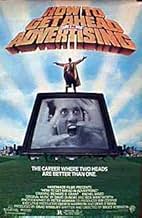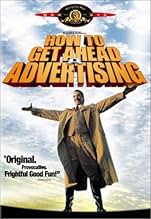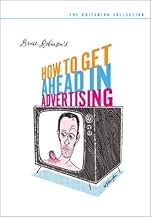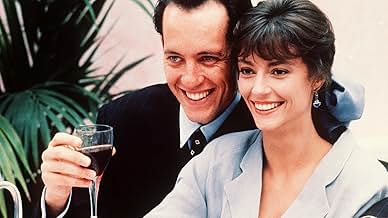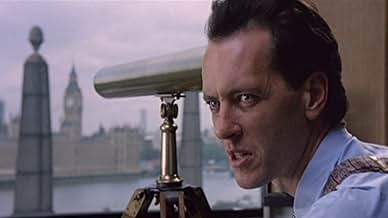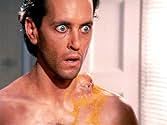IMDb-BEWERTUNG
6,8/10
6850
IHRE BEWERTUNG
Ein zynischer Werbemanager hat eine Blockade am Werk, die zu einer Kernschmelze führt.Ein zynischer Werbemanager hat eine Blockade am Werk, die zu einer Kernschmelze führt.Ein zynischer Werbemanager hat eine Blockade am Werk, die zu einer Kernschmelze führt.
- Auszeichnungen
- 1 Nominierung insgesamt
Empfohlene Bewertungen
Quite a special and singular film! I was not expecting the movie to go the route it did but I was very glad it did. Most films that go down the absurd path that this did usually end up somewhere in a pool of camp or B-movie status, but this movie has enough plausible meaning, and is written, acted, and delivered with such impeccable talent that it holds ground as a film that can be taken seriously thoroughly in all regards. The concept is quite brilliant and daring and it was pulled off in a manner that is only more impressive as the movie continues - there is intelligence behind it. I was thinking through most of it how it surprisingly didn't remind me of most other British films or even British humor that I have observed - the only thing I could really place it with is some of the more bizarre Australian books, shows, and films I have taken in over the years. Richard E. Grant honestly gives an Oscar worthy performance in this - he is a maniac, and his range deserves immense praise. The film does feel somewhat inconclusive, but I really don't have many complaints about it... I am excited to check out the director's most notable film, Withnail & I, soon.
This brilliant attack on commodification and the misuse of language to cajole consumerism is a must see. I don't like to give anything away so suffice to say that Grant is excellent as the near-schizophrenic hero (anti-hero) who's copy writer's block leads to his confronting the hegemony he operates within. The film mocks the abuse of semiotics in the media; one particularly hilarious scene has Grant battling his fellow-commuters over a newspaper story designed, per Grant's character, Bagley, to lead readers to directed conclusions. In the exchange about a heroin arrest reported in the paper, police allege that a bag containing heroin "may" have also contained marijuana. Bagley burst out with, "It may have contained a f***ing pork pie!" Hilarity ensues, but not devoid of a moral lesson...you may find the rendering of William Blake's "Jerusalem" at the film's conclusion particularly ironically amusing.
If you want nuance, you'll not find it here, subtlety, pah!!! No, it's laid on with a shovel as advertising executive Richard E Grant discovers advertising is more shallow than a paddling pool, and like said pool, if a toddler was unable to contain a lavatorial need, full of....well,you know what! The trouble is, although we see Grant having his breakdown, becoming obsessive and growing a boil which becomes his alter-ego, we do not see his journey, he's dubbed a success by everyone, but we do not see him succeed. We merely witness the repercussions of his desultory realisation that he's been part of the problem, rather than the solution.
The idea of the talking boil is fun, but the scriptwriter/director didn't know whether to make it surreal, knockabout or farce, in the end sticking to what he perceives as satire. I'd have liked the themes to have been developed more - together with the two differing characters within the same body. We each see thousands of commercials on television, commercialisation is everywhere, referees and umpires have ads on their sleeves, I'm expecting the police to have sponsors' names on their trousers when they finally come to get me.
This needed a little more subtlety, more comedy with the beautiful wife, who seemed discomforted by having sex with the brash alter-ego - that could have produced an amusing scene or three.
It's much better that Robert Altman's unsuccessful parody of fashion, Pret-a-Porter, but uses a sledgehammer to lance a boil.
The idea of the talking boil is fun, but the scriptwriter/director didn't know whether to make it surreal, knockabout or farce, in the end sticking to what he perceives as satire. I'd have liked the themes to have been developed more - together with the two differing characters within the same body. We each see thousands of commercials on television, commercialisation is everywhere, referees and umpires have ads on their sleeves, I'm expecting the police to have sponsors' names on their trousers when they finally come to get me.
This needed a little more subtlety, more comedy with the beautiful wife, who seemed discomforted by having sex with the brash alter-ego - that could have produced an amusing scene or three.
It's much better that Robert Altman's unsuccessful parody of fashion, Pret-a-Porter, but uses a sledgehammer to lance a boil.
In Withnail & I, Bruce Robinson made one of the funniest films there is. Therefore it's always going to be hard for anything else he's made to equal his debut. However, in How to Get Ahead in Advertising he comes mighty close.
The reason why Robinson's second film fails to match Withnail & I is because at times it becomes too preachy. There are some great speeches in the film; some wonderful digs at consumerism, but occasionally it descends into uninteresting ranting. Yeah consumerism can turn us into unthinking automatons, and yeah big business is greedy, but you don't really need to point it out so blatantly. We already know this. The film works much better when illustrates the BS or when it jabs at it. It doesn't need to get on its soapbox.
One of my favourite bits in the film is when Bagley (Richard E. Grant) a cocky advertising executive who suddenly loses his magic touch when he has to sell boil cream is listening to a bunch of idiots talking about a newspaper article. As a person who makes a living out of lying, he's appalled that they believe what the press tells them. They then begin to argue (there's a great bit when an Irish priest insists that a woman in a vice den had peanut butter smeared across her tits; it was in the paper so it must be true) and the conversation quickly turns to the boil cream that Bagley has become obsessed with. "They're incurable, all of them. I know that and so does everybody else. Until they get one. Then the rules suddenly change." And then he has a dig at the priest. "They want to believe something works. He knows that, which is why he gets a good look-in with the dying." It's a great scene; it's funny as hell and it also has a good point to make: people consume less out of desire and more out of a desperate sort of hope, or even fear; they hope this product or that product will fill the hole in their lives. They hope it will be the answer to all their problems. And thankfully this scene refrains from the preaching that affects the latter stages. Instead it goes right for the jugular.
But my favourite scene of all is the one with the psychiatrist Bagley has quit his job and developed a hideous boil of his own, one that talks to him and one that has a face. He's talking to the quack with a big bandage on his shoulder. He rants for a while about the way advertisers have ruined television, and then all of a sudden, after silence, the boil speaks. The way it's presented in the film, the boil (at first) has a separate voice to Bagley's. He's not portrayed as Gollum with a satanic pimple; he's not talking to himself. But at the same time you're never really sure whether you're seeing things from Bagley's perspective. He's gone totally crazy, so he may very well be the one saying all this crap. Plus the boil only speaks when Bagley's not looking the other person in the face. But what I love about the scene is the filth the boil speaks and Grant's reactions. His hysteria is hilarious (there's another magnificent bit of hysteria in the film when the boil first 'speaks', Bagley is so shocked that he runs to the kitchen, shaking and spazzing like he's got St Vitus' dance. Grant is amazing at working himself up into a lather). And then the boil asks Bagley to tell the shrink about his grandfather. "My grandfather was caught molesting a wallaby in a private zoo in 1919." "A wallaby?" "It may have been a kangaroo. I'm not sure." "You mean sexually?" "I suppose so. He had his hand in its pouch." I haven't heard dialogue that funny in a long time.
I also love the scene when Bagley is admitted to hospital to have the boil lanced. By now he's completely raving. He's going on and on about the evils of consumerism. So then the boil says, "You commies don't half talk a lot of s***." Magnificent! It's the sort of argument a Daily Mail reader would give. Criticise capitalism and you must be a goddamned Red. However, I can see where the boil is coming from. There are certainly times when Robinson is too militant. Like I said before, he really doesn't need to stand so high on his soapbox. But at the same time the film makes some excellent points. It's just that the film works better when it does it through comedy rather than rhetoric.
Another great scene, one that takes a poke at society's hypocrisy, is when Bagley argues with a feminist who thinks men should bleed. "And I think you're a vegan who eats meat in secret. You see, she doesn't deny it. She's a vegan who eats meat in secret." "I do not eat meat!" "But you'll eat fish, you'll eat fish until the cows come home." "Fish is allowed!" Of course, this enrages Bagley.
But although hypocritical lefties get a kicking too, the film, early on, raises an interesting point. If you're anti-consumerism, how do you spread your message without advertising? It's a bit of a kick in the teeth, that.
However, Robinson is smart enough to know that consumerism is here to stay. The film doesn't end with any hope. All we can look forward to is more advertising, more spending and more products. The world is one magnificent shop, indeed.
The reason why Robinson's second film fails to match Withnail & I is because at times it becomes too preachy. There are some great speeches in the film; some wonderful digs at consumerism, but occasionally it descends into uninteresting ranting. Yeah consumerism can turn us into unthinking automatons, and yeah big business is greedy, but you don't really need to point it out so blatantly. We already know this. The film works much better when illustrates the BS or when it jabs at it. It doesn't need to get on its soapbox.
One of my favourite bits in the film is when Bagley (Richard E. Grant) a cocky advertising executive who suddenly loses his magic touch when he has to sell boil cream is listening to a bunch of idiots talking about a newspaper article. As a person who makes a living out of lying, he's appalled that they believe what the press tells them. They then begin to argue (there's a great bit when an Irish priest insists that a woman in a vice den had peanut butter smeared across her tits; it was in the paper so it must be true) and the conversation quickly turns to the boil cream that Bagley has become obsessed with. "They're incurable, all of them. I know that and so does everybody else. Until they get one. Then the rules suddenly change." And then he has a dig at the priest. "They want to believe something works. He knows that, which is why he gets a good look-in with the dying." It's a great scene; it's funny as hell and it also has a good point to make: people consume less out of desire and more out of a desperate sort of hope, or even fear; they hope this product or that product will fill the hole in their lives. They hope it will be the answer to all their problems. And thankfully this scene refrains from the preaching that affects the latter stages. Instead it goes right for the jugular.
But my favourite scene of all is the one with the psychiatrist Bagley has quit his job and developed a hideous boil of his own, one that talks to him and one that has a face. He's talking to the quack with a big bandage on his shoulder. He rants for a while about the way advertisers have ruined television, and then all of a sudden, after silence, the boil speaks. The way it's presented in the film, the boil (at first) has a separate voice to Bagley's. He's not portrayed as Gollum with a satanic pimple; he's not talking to himself. But at the same time you're never really sure whether you're seeing things from Bagley's perspective. He's gone totally crazy, so he may very well be the one saying all this crap. Plus the boil only speaks when Bagley's not looking the other person in the face. But what I love about the scene is the filth the boil speaks and Grant's reactions. His hysteria is hilarious (there's another magnificent bit of hysteria in the film when the boil first 'speaks', Bagley is so shocked that he runs to the kitchen, shaking and spazzing like he's got St Vitus' dance. Grant is amazing at working himself up into a lather). And then the boil asks Bagley to tell the shrink about his grandfather. "My grandfather was caught molesting a wallaby in a private zoo in 1919." "A wallaby?" "It may have been a kangaroo. I'm not sure." "You mean sexually?" "I suppose so. He had his hand in its pouch." I haven't heard dialogue that funny in a long time.
I also love the scene when Bagley is admitted to hospital to have the boil lanced. By now he's completely raving. He's going on and on about the evils of consumerism. So then the boil says, "You commies don't half talk a lot of s***." Magnificent! It's the sort of argument a Daily Mail reader would give. Criticise capitalism and you must be a goddamned Red. However, I can see where the boil is coming from. There are certainly times when Robinson is too militant. Like I said before, he really doesn't need to stand so high on his soapbox. But at the same time the film makes some excellent points. It's just that the film works better when it does it through comedy rather than rhetoric.
Another great scene, one that takes a poke at society's hypocrisy, is when Bagley argues with a feminist who thinks men should bleed. "And I think you're a vegan who eats meat in secret. You see, she doesn't deny it. She's a vegan who eats meat in secret." "I do not eat meat!" "But you'll eat fish, you'll eat fish until the cows come home." "Fish is allowed!" Of course, this enrages Bagley.
But although hypocritical lefties get a kicking too, the film, early on, raises an interesting point. If you're anti-consumerism, how do you spread your message without advertising? It's a bit of a kick in the teeth, that.
However, Robinson is smart enough to know that consumerism is here to stay. The film doesn't end with any hope. All we can look forward to is more advertising, more spending and more products. The world is one magnificent shop, indeed.
Denis Dimbleby Bagley (Richard E. Grant) is an amoral British ad executive. He's willing to sell anything to anyone. His next product pimple cream makes him obsessed with boils. His wife Julia Bagley (Rachel Ward) is concerned. He starts breaking down and growing a boil on his left shoulder. He's in the hospital to have it removed when it starts growing into a new head. His real head is lanced and the boil takes over his life as the new head.
Bruce Robinson's previous directing/writing effort 'Withnail and I' is a British indie darling. Richard E. Grant returns with brilliant effect. It is a dark rant on the ills of consumerism and a little obvious. It would be great to have more plot rather than a diatribe. This would have been a great Twilight Zone episode. A story is needed around the zit cream. Otherwise, it's a good surreal effective satire.
Bruce Robinson's previous directing/writing effort 'Withnail and I' is a British indie darling. Richard E. Grant returns with brilliant effect. It is a dark rant on the ills of consumerism and a little obvious. It would be great to have more plot rather than a diatribe. This would have been a great Twilight Zone episode. A story is needed around the zit cream. Otherwise, it's a good surreal effective satire.
Wusstest du schon
- WissenswertesWriter/director Bruce Robinson provided the voice of the boil.
- PatzerAfter Bagley has lunch with his wife, she drops him back at the advertising firm's office building, but it is a different building to the one used for the interior scenes, which is the tall red building several hundred yards up the street (visible in the crane shot of their car pulling up), right next to the Lambeth bridge, as we can see from the window view in the scenes in Bagley's and Bristol's offices.
- Zitate
Denis Dimbleby Bagley: My grandfather was caught molesting a wallaby in a private zoo in 1919.
Psychiatrist: A wallaby?
Denis Dimbleby Bagley: It may have been a kangaroo. I'm not sure.
Psychiatrist: You mean sexually?
Denis Dimbleby Bagley: I suppose so. He had his hand in its pouch.
- VerbindungenEdited into Video Macumba (1991)
Top-Auswahl
Melde dich zum Bewerten an und greife auf die Watchlist für personalisierte Empfehlungen zu.
- How long is How to Get Ahead in Advertising?Powered by Alexa
Details
- Erscheinungsdatum
- Herkunftsland
- Offizieller Standort
- Sprache
- Auch bekannt als
- How to Get Ahead in Advertising
- Drehorte
- Datchet Railway Station, Datchet, Berkshire, England, Vereinigtes Königreich(scene where train pulls into station)
- Produktionsfirma
- Weitere beteiligte Unternehmen bei IMDbPro anzeigen
Box Office
- Bruttoertrag in den USA und Kanada
- 418.053 $
- Weltweiter Bruttoertrag
- 418.053 $
- Laufzeit1 Stunde 30 Minuten
- Farbe
- Sound-Mix
- Seitenverhältnis
- 1.85 : 1
Zu dieser Seite beitragen
Bearbeitung vorschlagen oder fehlenden Inhalt hinzufügen




